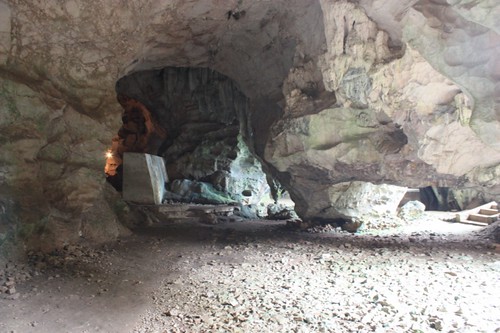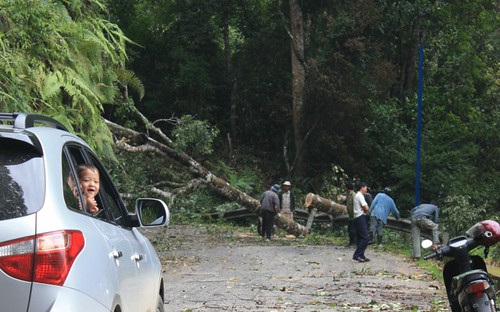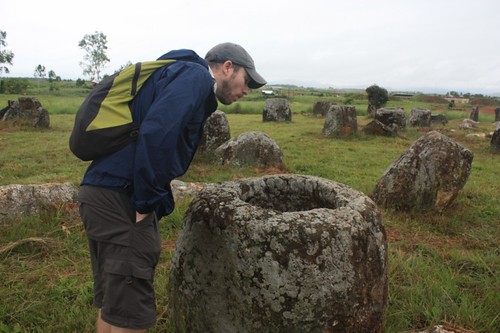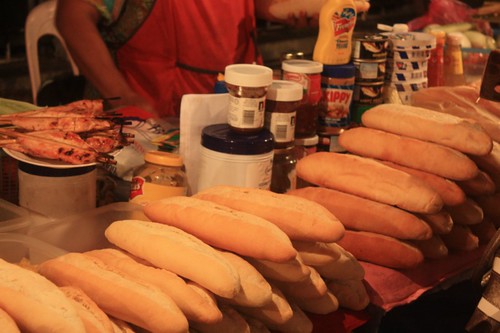Leaving the cat behind we got an overcrowded
boat back to Nong Khiaw and took in the spectacular scenery we missed during
our rainy trip north, unfortunately our bags were at the bottom of the pile on
the boat and were soaking wet by the time we arrived. We got our tickets for a
14 hour bus ride to Sam Neua and Jo went off to find some lunch for the
journey, when we experienced reverse Laos time when the bus turned up 45
minutes early! With Jo nowhere to be seen I loaded the bags onto the bus, asked
them to wait and went looking for her, luckily Nong Khiaw is relatively small
so finding her didn’t prove too difficult and we were on our way.
The ride took in the most fantastic scenery
yet, the roads were windy and steep and the bus driver would probably have been
a rally driver in another country. He was actually a good driver but not the
sort of driver you want on public transport. The driver and the roads took
their toll on the bus, every hour we stopped and water was thrown onto the
brake discs to cool them down and after 6 hours they finally packed up. We had
finally broken down for the first time and to top it off we were in a National
Park known for its tigers, where local villagers don’t venture out after dark
through fear of being eaten. Luckily, it wasn’t yet dark and the driver and his
pit crew had all the tools and were able to get the bus going again.
Despite breaking down we still arrived in Sam
Neua 4 hours early where we spoke with a French couple who had been cycling
around Asia for nine months as a honeymoon. We shared a sawngthaew to look for
a guesthouse and both decided on a guesthouse where the owner, the Danny Devito
of Laos, a shirtless, short rotund guy spoke a thousand words a minute but not
a word of English which amused us all, him included.
Sam Neua had a very Russian feel too
it..............
Vieng Xai
The reason for heading to Sam Neua is not to
see the Russian looking monuments

It’s to visit Vieng Xai, an idyllic little
town of limestone cliffs and karsts. The town is renowned in Laos history as it
is here that the Pathet Lao (land of the Lao) hid during the second Indochina
War (Vietnam War). Fearing a communism ‘domino effect’ in South East Asia, the
US secretly dropped more bombs on Laos between 1964 -73 than were dropped
during WW2.
Using the natural surroundings near the
Vietnam border, the Pathet Lao hid from US aerial bombardment in over 400 caves
of which 6 of the most important are now open to the public. The caves are no
longer furnished but give an idea of the conditions the people lived in.

We finished the tour around 11.30 and headed
back to the bus station past some lakes made from bomb craters,

to make our way back to Sam Neua. With no
staff around and no timetable, we decided to have lunch at a food stall next to
the bus station. We asked the restaurant owner when the next sawngthaew was and
she said 1o’clock. The sawngthaew turned up at 1.30 and the driver mimed eating
and indicated he would be back at 2pm. Laos time being what it is, we didn’t
expect him to return at 2 and he didn’t disappoint arriving at the not
unreasonable 2.30. He then indicated that he would now be leaving at 3pm. 3 o’clock
came and went and at 3.30 he headed off again, but not before suggesting 4 as
the new departure time.
At 4 a worker from the bus station came over
to us and placed his hands together and put them by the side of his head,
miming sleep and then pointed to the ground. We thought that he was suggesting
that we should have a sleep while we waited. When everyone else left the bus
station we realised that he was telling us we should find somewhere to sleep in
Vieng Xai as there would be no transport for the rest of the day!
Public transport in Laos is not public in the
true sense of the word, the majority is privately run with the drivers owning
the vehicles, if there aren’t enough bodies then the transport doesn’t run. So not
wanting to pay for 2 rooms, leave our unsecured belongings unattended back in
Sam Neua or rearranging our onward travel plans we were left with no other
option than to try and make our own way back. Being that it was a 30 very hilly
kilometre trek, walking was quickly discounted. Trying to convince locals with
cars to help us get back fell on deaf ears, so we decided to try the guest
houses in the hope that someone would be able to speak English and be able to
help us find some transport. It took a few guest houses and a few strange looks
but we finally found someone who was prepared to help. Laos may be different to
many other countries, but money still talks, it’s just that here less is
needed.
So after agreeing a price of $US20 we had
ourselves an off duty sawngthaew which when deducting the price of paying for
an extra room and the actual cost of travel back the next day it amounted to a
little under $10, so we were very happy and relieved to pay for the
convenience. At times during the day I considered it the worst day of the trip
so far, but having worked through the challenge it ended up being one of the
better days for what we managed to achieve.
Phonsavan
The next morning we easily made our scheduled
bus to get to our next destination of Phonsavan. The bus station had a great
view

There wasn’t a very diverse range off food
for breakfast on offer at the bus station, so we ended up with a bag of sticky
rice each!

The journey was a little different to the
previous trips but alluring none the less, this time our unscheduled stop was
for a tree that had fallen across the only road out of town, while locals with
chain saws cleared the way.

In Phonsovan we went to the Mines Advisory
Group (MAG) office to find out more about Unexploded Ordinance (UXOs - clusters
bombs, land mines, grenades). During the second Indochina war over 30% or
around 131 tonnes of all ordinance used on Laos didn’t detonate and people are
still affected today as most remains undiscovered. Farmers are afraid to expand
their land boundaries due to fear of UXOs. The poor collect UXO scrap metal to
subsidise their income but the the recipients don’t what the explosives so the
collectors try to remove it themselves often with disastrous results.
Inquisitive children are also affected despite efforts to educate them.
According to MAG, at the current rate it will take over 100 years to clear Laos
of UXOs.
After educating ourselves we booked onto a
tour to see the Plain of Jars. The Jars are a little like Stonehenge, i.e.
stone constructions of which no one really knows their purpose. Plain is an apt
way of describing them, the first few were interesting to look at and trying to
guess their purpose also caused some amusement, but in all honesty they didn’t
excite me, without any history and information about them, it was just looking
at concrete in a field.

At one site I had a call of nature and
thought about going in the bushes, but hastily retreated when I realised it
would have meant stepping into the red zone and not staying in the safe white
zone area already cleared of UXOs.

Getting back to nature in this area is not a
good idea! Something else that struck us as not a good idea was golf. However,
on the way back to our guesthouse we saw a sign for ‘adventure golf’,
adventurous indeed!
Luang Prabang
Our next port of call was the much hyped
Luang Prabang and thankfully it didn’t disappoint, if anything it exceeded our
expectations.
Not being able to write a blog without mentioning the journey, this is one that will be etched in my mind for ever. The scenery was 'Laos normal' but the music, well I don't really know where to begin. Like in all countries in South East Asia the music on buses is played at the loudest setting and in Laos they play mostly Thai pop, which i thought was the worst music in the world, until...... and I'm not sure if they played this for our benefit, they decided to play the Vengaboys greatest hits along with Aqua and other less noted Euro dance-pop acts (if that's possible), my ears are still bleeding!
The town was made up of beautiful French colonial buildings,
understated temples and monasteries, which were smaller and had more rustic
charm than those in Thailand.

The food was also to die for, with cake,
crepe and baguette stalls

and the night market particular highlights


One of the major ‘falang’ attractions in
Luang Prabang is getting up at least once at 5 am to see the monks collecting
alms. Jo broke her morning curfew to venture out on her own early to witness
this, only to return an hour later to say she couldn’t find the masses she was
expecting and had to chase a small group of monks down a road to catch up with
them for the obligatory alms giving shot to prove she did it, but still not
worth getting up so early for!

Maybe the monks were put off by the rain, it
did rain a lot while we were in Luang Prabang, but that didn’t dampen our
spirits, or the glasses of wine we indulged in for the first time on the road!
Vang Vieng
From Luang Prabang we headed to another much
hyped town, Vang Vieng. This also matched the hype but that wasn’t a good
thing. 10 years ago we probably would have loved Vang Vieng a sort of Phuket
meets Khao San Road of Laos. The main activity is sitting in tractor tyre
tubing and floating 4km down river, stopping at make shift bars to get drunk
along the way. The town itself is full of bars with bright neon lights,
restaurants showing continuous episodes of Friends and every other plot of land
has a building site on it, waiting for a new hotel to be built to fill with
more Falang. I shudder to think what the locals must think of Westerners based
on this snapshot of life. This is not the place to discover Laos.
We packed up our pipes and slippers and
headed off the next morning. At the bus station we were greeted with a
suspicious “the bus is full, but you can get a more expensive minibus in 10
mins”. As the next bus was a 4 hour wait we decided it was worth it, and made
our way to Le Capital..........
Hope you’re all well
Ryan & Jo
http://www.flickr.com/photos/dojo77/collections/72157620848132640/